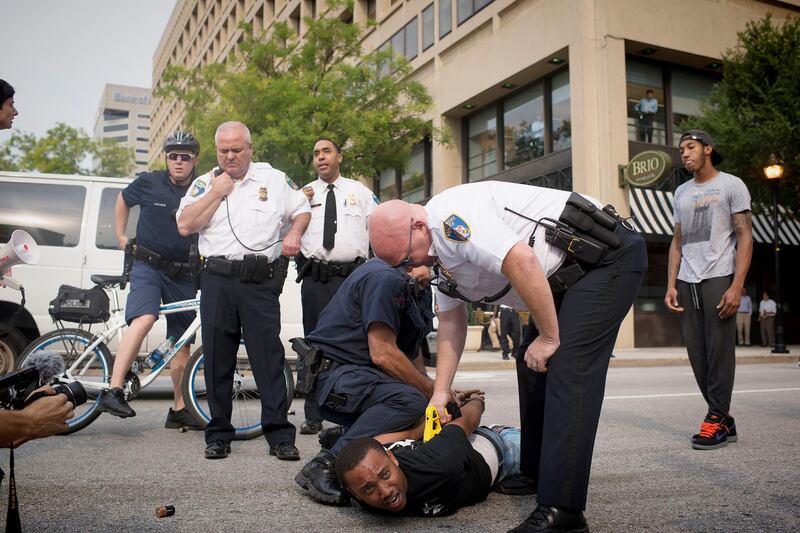If you're looking for fake news, you won't find it in Baltimore Rising, the new HBO documentary about the struggle of police and activists to hold this venerable American city together in the wake of bloody strife. In fact, the gritty truth about its urban and social decay may make your hair stand on end.
It's not a "puff piece" about the city's history as an important seaport, that it is the birthplace of national anthem The Star-Spangled Banner, nor is it a call to tourists to board its Civil War-era warship, the USS Constellation, to gaze at the marine creatures in the National Aquarium or to chow down on seafood ambrosia at its upscale crab shacks.
Instead, this film – which premieres on Sunday, on OSN Series First HD, Home of HBO – reflects a sincere and enlightening effort by its producers and participants to humanise a city that’s been way down on its luck for decades – a situation only exacerbated after the national media sensationalised the protests and riots that erupted after the death of Freddie Gray.
For those unfamiliar with the ongoing national controversy, Gray was a 25-year-old African American arrested in April 2015 for what police described as an illegal switchblade. The film chronicles the passionate feelings on all sides after Gray died a week later, sustaining a critical spinal injury to his neck in police custody. The city of Baltimore eventually reached a US$6.4 million (Dh23.5 million) settlement with Gray’s parents.
Someone who truly loves the city, director and actress Sonja Sohn, is behind the production. She's best known for her starring role as lead detective Kima Greggs in The Wire (2002-2008), the acclaimed HBO series which dramatised the efforts of law enforcement to rein in the city's illegal drug trade and detailed the seaport system, government and bureaucracy, education and schools, and the print news media. During her tenure on the hit series, Sohn forged close ties with Baltimore's community leaders – and ultimately decided to shoot her documentary as a labour of love and part of her "community work".
“I said, ‘The people of Baltimore are actually engaging in a much more sophisticated conversation than I was hearing or at least that the media was covering in other cities,’” says Sohn. “So at that point, it was simply my love for the community, my love for justice and my mission... and I feel like my purpose is to make the world a better place and to fight for justice and truth and freedom.”
Appearing prominently in Sohn’s documentary are city activists Kwame Rose and Makayla Gilliam-Price. An artist, writer, musician and public speaker, Rose gained notoriety during the uprising that followed Gray’s death, for his live, on-camera shouting match with Fox News reporter Geraldo Rivera: “I want you and Fox News to get out of Baltimore city, because you’re not reporting about the boarded-up homes, you’re not reporting about the poverty levels - what you’re here for are the black riots.”
Arrested during protests outside the trials of the six police officers charged in the Gray case, Rose recently accepted a position in the office of Baltimore mayor Catherine Pugh. As a high school student, Gilliam-Price founded City Bloc, the youth justice organisation. Meanwhile, she also pushes for changewith Leaders of a Beautiful Struggle, a grassroots think-tank.
In her documentary, Sohn also introduces police officers, community leaders and gang affiliates, who debate the struggle to hold Baltimore together and how hard it is to make change when change is hard – even as the homicide rate hits record highs in this metropolitan area of up to three million people. It soon becomes obvious that the division here between authorities and the community is more than deep – it’s a veritable abyss of mistrust and suspicion of each other’s motives.
_______________________
Read more:
[ American sport was racist for a long time before Donald Trump came along ]
[ Oh say can you see, why so proudly we hail our national anthems? ]
[ Former presidents decry state of US under Donald Trump ]
_______________________
The visuals and sounds of urban decay can also be depressing – the sadness of a lingering camera pan of empty, boarded-up, dilapidated rows of houses that dominate much of the city’s neighbourhoods, set against the shrill wail of a distant police siren.
Even in its opening moments, as local politician Councilman Carl Stokes strolls with a reporter down a decrepit street, the documentary engages the viewer as it clarifies a root cause of the city’s grief.
“I walked down the street with a reporter from a national network who looked around at all of these boarded-up properties and said to me, ‘Councilman, that riot really tore up this community, didn’t it?’”
“And I said, ‘Look again. Look at the boards on those homes. Do they look like they were tacked up there yesterday? No, they’ve been there 20 years, maybe longer... The riot didn’t tear up the community. The condition of the community caused the uprising that we had.’”
No one was ever convicted in connection with Gray’s death. Three police officers were acquitted, and charges were dropped last year for the other three in the case.
To its credit, Baltimore Rising, in due course, conjures up a hopeful view of the city's prospects, which is no mean feat. It documents the surprising ways in which people on all sides come together to fight for justice and healing – in the process taking down adversarial walls to discover their common humanity.
Baltimore Rising airs at 11pm Sunday on OSN Series First HD, Home of HBO. See listings for more viewing times










